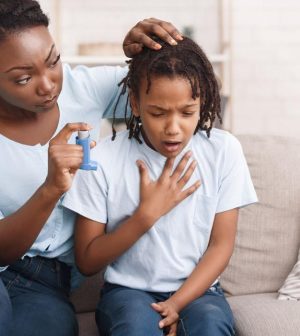- Could Your Grocery Store Meat Be Causing Recurring UTIs?
- Are You Making This Expensive Thermostat Error This Winter?
- Recognizing the Signs of Hypothyroidism
- 10 Strategies to Overcome Insomnia
- Could Artificial Sweeteners Be Aging the Brain Faster?
- Techniques for Soothing Your Nervous System
- Does the Water in Your House Smell Funny? Here’s Why
- Can a Daily Dose of Apple Cider Vinegar Actually Aid Weight Loss?
- 6 Health Beverages That Can Actually Spike Your Blood Sugar
- Treatment Options for Social Anxiety Disorder
Back-to-School Tips on Preventing Asthma, Allergy Flares in Kids

Heading back to school requires supplies and planning for all, but if you’re a parent of a child with allergies or asthma then you have even more to consider.
“The start of a new school year is exciting for some, but for parents of children with allergies and asthma, their thoughts are probably on keeping their child free from triggers that can cause allergic reactions,” said allergist Dr. Kathleen May, president of the American College of Allergy, Asthma and Immunology (ACAAI).
“Allergies and asthma can significantly impact a child’s well-being and academic performance, but with proper preparation and management, they can thrive in the school environment,” May said in an ACAAI news release.
ACAAI offers four tips to help parents get their child off to a smart start to the school year.
Identify allergy triggers: Find out what’s causing your child’s allergic symptoms, such as pollen, mold, dust mites, pet dander or certain foods. Work with your child’s allergist to make sure you have the right treatments in place, including getting the proper prescriptions for their weight and age.
Share your action plan: Your child’s management plan should outline symptoms, medications, emergency contacts and what to do in the event of flare-ups. Be sure the school nurse, teachers and other staff are familiar with the plan and are prepared to respond effectively in case of an emergency. Try to meet with school staff before classes begin to talk about the plan.
Make lunchtime safe: Your child may be able to easily identify their own food allergies and tell others what they can and can’t eat. Make sure they know they shouldn’t eat food brought by their friends. If your child is eating cafeteria food, make sure staffers know about your child’s food allergies to avoid cross-contamination during mealtimes. Encourage your school to label food options so your child can choose wisely.
Make sure your child’s epinephrine auto injector, and a spare, are available if needed.
Keep kids active: Exercise and active play is essential to kids’ well-being. Make sure your child who has asthma or reacts to outdoor allergens has taken allergy medicine before leaving for school and that they’re carrying any needed relief inhalers.
Consider seeking indoor opportunities for them to participate in if pollen counts are high or air quality is bad. Alert coaches about your child’s asthma, so they can also be prepared for a flare-up.
More information
The U.S. National Library of Medicine has more on asthma in children.
SOURCE: American College of Allergy, Asthma and Immunology, news release, Aug. 1, 2023
Source: HealthDay
Copyright © 2026 HealthDay. All rights reserved.










